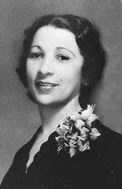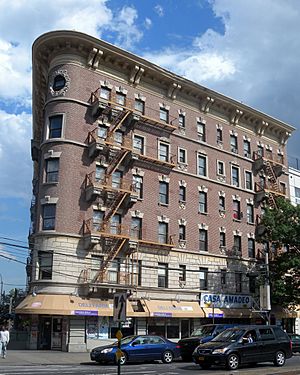Victoria Hernández facts for kids
Quick facts for kids
Victoria Hernández
|
|
|---|---|

1930 photograph from Miguel Angel Amadeo
|
|
| Born | March 23, 1897 |
| Died | April 11, 1998 (aged 101) |
| Nationality | Puerto Rico |
| Other names | "La Madrina" (the godmother) |
| Citizenship | United States |
| Occupation | music entrepreneur |
| Years active | 1927–1969 |
| Known for | opening the first Latin music store in New York City |
| Relatives | Rafael Hernández Marín |
| Musical career | |
| Origin | New York City |
| Genres | Latin music |
| Instruments | piano |
| Years active | 1919–1969 |
| Labels | Hispano |
| Associated acts |
Cuarteto Victoria ("Victoria Quartet")
|
Victoria Hernández (born March 23, 1897 – died April 11, 1998) was an amazing Afro-Puerto Rican businesswoman in the music world. Even though she was a very talented musician herself, she chose to focus on the business side of music.
In 1927, Victoria opened the very first Latin music store in New York City. This was a big deal! At that time, only a few businesses were owned by Puerto Rican women who had moved to the city. Victoria also helped record labels find new music talent. She even owned her own record label for a while. She later opened another music store called Casa de Música, which became Casa Hernández. Today, this store is known as Casa Amadeo, antigua Casa Hernandez. It is the oldest music store in New York City that has been open continuously!
Contents
Early Life and Music
Victoria Hernández was born on March 23, 1897, in Aguadilla, Puerto Rico. Her parents, María Hernández Marín and José Miguel Rosa Espinoza, worked with tobacco. Her father was also a skilled guitar player.
Victoria was the oldest daughter in her family. All of her younger brothers and sister became great musicians. These included Rafael, Jesús "Pocholo", and Rosa Elvira. Their grandmother, who lived with them, really encouraged them to study music. Victoria learned to play the cello, violin, and piano very well.
Starting a Music Business
In 1919, Victoria moved to New York City with her mother, grandmother, and siblings. She started working as a seamstress in a factory. To earn extra money, she also gave piano lessons.
Just eight years later, in 1927, Victoria and her brothers bought a store in East Harlem. They named it Almacenes Hernández, which means Hernández Music Store. This was the first music store in New York City owned by Puerto Ricans! They sold records, guitars, and even music rolls for player pianos.
In the back of the store, Victoria taught music lessons to future stars like Tito Puente. Her brother Rafael also composed many songs there. Back then, it wasn't common for women to be popular musicians. So, Victoria ran the business. This helped her family and allowed her brothers to focus on writing and performing music. A historian named Virginia Sánchez Korrol said that Victoria was one of only sixteen Puerto Rican women who owned businesses in the United States at that time.
Her Own Record Label
In 1927, Victoria started her own record label called Hispano. Her label released music from popular Puerto Rican groups. She also produced songs written by her brother Rafael, including his famous song Pura Flama.
Victoria sold many records. But then, her bank failed because of the Great Depression. This forced her to close her record label in 1929. As her business grew, she needed more space. So, in 1930, she moved the store to a new location.
Supporting Musicians
In 1932, Rafael formed a music group called Cuarteto Victoria (Victoria Quartet). He named it in her honor! Victoria became their booking agent. She planned their tours and recording sessions. She wanted musicians to be seen as professional. So, she made sure the quartet wore suits and ties instead of fancy costumes.
Victoria became well-known for her work. Record labels like Columbia Records and Decca asked her to find musicians for their recording sessions. Bandleaders like Xavier Cugat also came to her looking for talented players. Victoria often helped musicians by giving them money in advance. This earned her the nickname La Madrina, which means "the godmother."
In 1939, the Hernández siblings sold Almacenes Hernández. Victoria and Rafael then left the United States. They went to Puerto Rico, Curaçao, and toured in other countries. In 1940, they settled in Mexico City.
After trying to start a business in Mexico, Victoria returned to New York City in 1941. She opened another music store called Casa de Música in The Bronx. Her brother Rafael was still listed as an owner, but Victoria ran the business herself. She sold instruments, records, and sheet music. She also sold men's suits, women's clothes, and hats. She even gave music lessons to earn more money. It was common back then for stores to sell many different things.
Victoria soon renamed her business Casa Hernández. She ran it until 1965, when her brother Rafael passed away. She lost interest in the store after his death. She hired Johnny Cabán to manage it for the next four years.
In 1969, Victoria sold the store to Miguel Angel "Mike" Amadeo. He renamed it Casa Amadeo, antigua Casa Hernández. This name kept the historical connection to the Hernández family. This store is still open today! It has been operating longer than any other music store in New York City. After selling the store, Victoria became friends with Gabriel Oller. He owned the second Puerto Rican music store in New York. Victoria lived in Manhattan until the 1980s.
Later Life and Legacy
Victoria Hernández passed away on April 11, 1998, in Trujillo Alto, Puerto Rico. She was buried in her brother Rafael's tomb in the Santa María Magdalena de Pazzis Cemetery in Old San Juan.
Victoria's life shows how women in her time could be both traditional caregivers and successful business owners. She was a true pioneer in the music industry!
See also
- List of Puerto Ricans
- History of women in Puerto Rico
 | John T. Biggers |
 | Thomas Blackshear |
 | Mark Bradford |
 | Beverly Buchanan |


